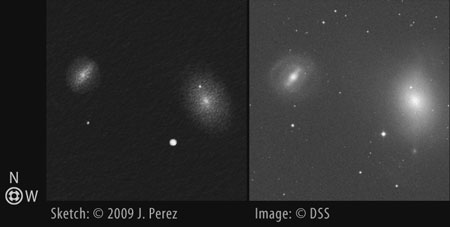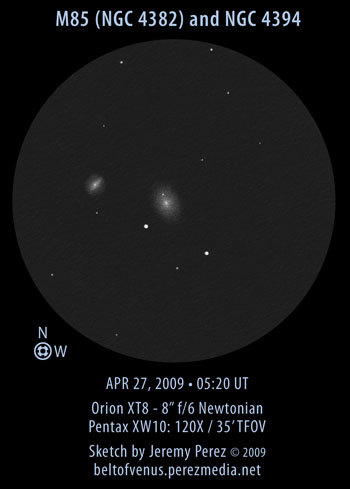Observation Notes:
This was a great pair to observe. M85 had a stellar core and was mildly elongated at a PA of about 25 degrees and appeared to be about 4 x 3 arc minutes in size. A star was embedded just northeast of its core. NGC 4394 was about 7 arc minutes to the east-northeast and also had a stellar core. Its circular profile was adorned with a bar positioned at a PA of 140 degrees. It appeared to be about 2.5 arc minutes in diameter.
A cursory look at the DSS image shows M85’s outer profile to be aligned almost exactly north-south. However, examining this and other images further suggests that the brighter, inner portion of the galaxy is elongated to the northeast as I noticed in this observation.

Sketch/DSS Photo Comparison of Messier 85 (NGC 4382) and NGC 4394
Object Information:
Galaxy M85 is about 125,000 light years in diameter and 60 million light years away. Although originally classified as a lenticular S0 galaxy, deep exposures show indications of spiral structure. Apparently, the foreground star northeast of the core has repeatedly been mistaken for a supernova. M85 is paired with barred spiral NGC 4394 about 8 arc minutes to the east. Both galaxies are receding at 700 m/sec which suggests that they are physically paired.
M85 was discovered in 1781 by Pierre Méchain, and is also cataloged as UGC 7508, MCG+03-32-029, VCC 798, PGC 40515, h 1242, GC 2946, CGCG 099.045, KCPG 334A.
NGC 4394 was discovered by F.W. Herschel in 1784 and is also catalogued as UGC 7523, MCG+03-32-035, VCC 857, PGC 40614, H II-55, h 1251, GC 2957, CGCG 099.047, KCPG 334B, IRAS 12234+1829.
| Subject | M85 (NGC 4382) and NGC 4394 |
| Classification | M85: Lenticular or Spiral Galaxy (Type SA(s)+P) NGC 4394: Spiral Galaxy (Type (R)SB(r)b II) |
| Position* | M85: Coma Berenices [RA: 12:25:24.2 / Dec: +18:11:27] NGC 4394: [RA: 12:25:55.6 / Dec: 18:12:50] |
| Size* | M85: 7.1′ x 5.5′ NGC 4394: 3.6′ x 3.2′ |
| Brightness* | M85: 9.2 vMag; 10.1 bMag; 13.1 Surface Brightness NGC 4394: 10.9 vMag; 11.5 bMag; 13.4 Surface Brightness |
| Date/Time | APR 26, 2009 – 10:20 PM (APR 27, 2009 – 05:20 UT) |
| Observing Loc. | Flagstaff, Arizona – Home |
| Instrument | Orion SkyQuest XT8 Dobsonian (203 mm dia./1200 mm F/L) |
| Eyepieces/Mag. | Pentax XW10 (120X) |
| Conditions | Clear, breezy, porch lights |
| Seeing | 5/10 |
| Transparency | Mag 5.5 NELM |
| *Sources | SEDS; NGC/IC Project; DSS; Starry Night Pro Plus 5; Atlas of the Messier Objects – Ronald Stoyan |

As always your sketches are amazingly accurate. If the observers of old had put that sort of accuracy into their notes we would have a few less discrepancies in the NGC.
Not many posts lately, I hope you are finding opportunity to get out and observe!
Thanks Andrew. I’m grateful for one advantage I have over the original discoverers–knowing whether a galaxy is elliptical or not. It definitely helps budget observing time, knowing which galaxies have some glimmer of potential to show structure. Although I try to avoid prejudicing myself to how or where the structures may be oriented and shaped, it still feels pretty unfair…but it sure is great to see lumps and whisps emerge from a galactic disc.
I’ve got several more galaxy and double star observations/sketches from this past Spring and a few recent Lunar drawings that I need to get prepped and posted. The Astronomy Now column has taken precedence on my Astro-time these days, so I keep building up these backlogs of material to post, but can’t get to regularly. I started getting things lined up this weekend though, so hopefully it will start moving through the pipeline more fluidly